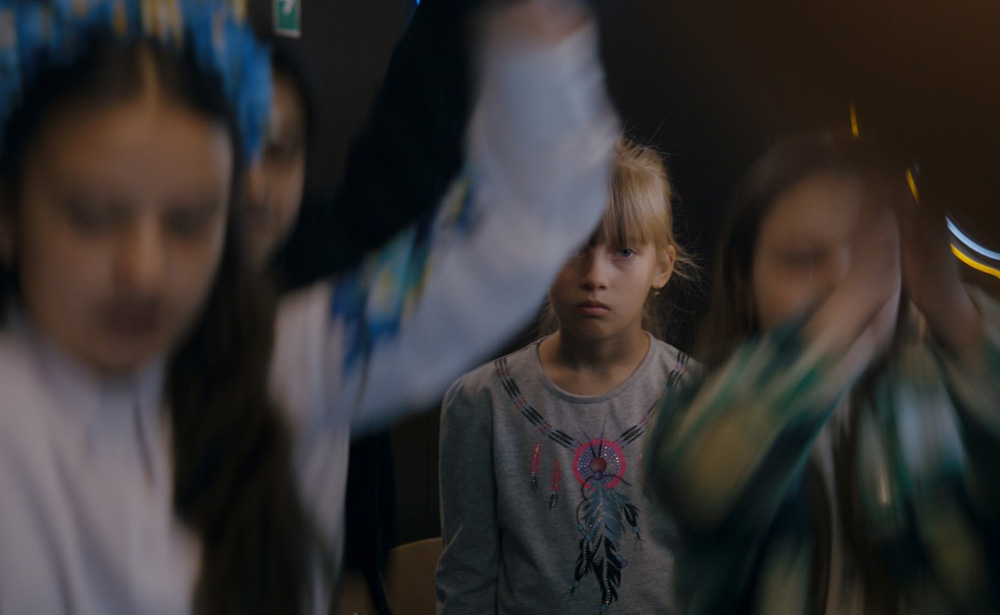There’s a scene early on in “Timestamp” in the Ukrainian village of Kamianka where an elementary school is holding a traditional cultural celebration of song and dance before air raid sirens go off, leading the faculty to quickly evacuate the playground and bring all the students to the basement where the surroundings may not look festive, but nonetheless spirits remain high as teachers continue to engage the young with various games and chants. This isn’t a show of willful ignorance of the Russian invasion happening just 140 kilometers away, as director Kateryna Gornostai will note the distance from the frontlines of all the schools across her native country she surveys in her magnificent second feature, but rather a display of hope where there would seem to be none when the adults providing a younger generation with as normal an upbringing as possible in the midst of war reflects a belief that they’ll reach a day when all this may be a distant memory.
Among recent documentary dispatches from Ukraine, there has often been defiance and despair, but “Timestamp” provides another view entirely as Gornostai peers into classrooms far and wide, some as spare as a teacher with a blackboard outdoors with a camera propped up on a lawn chair to teach algebra on Zoom to students ushered into the offices above subway tracks where they are safely underground, to show how Ukrainians have continued to make education a priority against all odds. The classes themselves are largely no different than they would be in the rest of the world, but what’s being taught is increasingly geared towards how to survive the war as those high school students taking drafting as an elective receive an education on how to build shelters and history lessons would seem to be as much about the present as the past as a teacher asks his pupils what year Tsarists began banning the Ukrainian language from textbooks.
Gornostai can often point the camera in one direction to see schools function as they would in times of peace and a mere tilt to the left could reveal the devastation outside, but throughout “Timestamp” keeps the spectre of war at bay as the faculty does for the sake of their students, perhaps creeping into lesson plans and requiring extra care for students with relatives in the army, yet never making it their burden to bear. The director and editor Nikon Romanchenko gracefully move from one place to another, aided substantially by a sprightly a cappella score from Alexey Shmurak, but what’s truly marvelous is how the observational doc is structured to touch on all aspects of life in the region as it exists now and the future impact the war will have as one science teacher covers the environmental effects “human activity” is having in the area and a frustrating rebuilding project of a high school is underway in Borodyanka where parents are frustrated by the slow work of a contractor even after funding from Lithuania has been made available.
Inevitably, “Timestamp” concludes like any school year does with a graduation, providing a particular gut punch when a speaker notes that in the ten years this current graduating class attended school, all they’ve ever known is war, and as some students are robbed of the feeling of community in virtual ceremonies versus in-person affairs, the unfairness of the situation needn’t be emphasized any more. But when the destruction of an entire way of life is the aim of their adversaries beginning with their buildings and continuing onto their culture, the mere act of observation even aside from the perseverance captured of the Ukrainian people is a powerful one when it’s history that resists such erasure and as the teacher at an art studio in Kharkiv tells his class of young Rembrandts (or aesthetically, more like young Jackson Pollocks), “It’s our task to preserve all the beauty,” it’s clearly a lesson that Gornostai herself took to heart.
“Timestamp” will screen again at Berlinale on February 21st at 12:45 pm at Urania, February 21st at 6:30 pm at Uber Eats Music Hall, February 22nd at 8:30 pm at Haus der Berliner Festspiele, and February 23rd at 10 am at HKW 1 – Miriam Makeba Auditorium.




